
Yes, We Have Bananas…
… and avocadoes, mangoes, kumquat and kiwi, too. Kathryn and Keith Selfe from Carreglefn Nurseries, Anglesey (01407 711148), write about the wide range of exotics and tropical plants suitable for the British climate.
“Citrus, difficult? Not really! Citrus (Lemons, Oranges, Limes etc.), as with many plants, includes a wide range of varieties, some tough and some tender. It’s a case of selecting the right level of hardiness for your particular growing situation.
“If you are lucky enough to have a conservatory or greenhouse for overwintering, then the list of suitable varieties is long. If you don’t, then tough ‘Farmers’ Citrus’ (commercial fruiting varieties) will happily grow outside.
“Still sceptical? Then what about Kiwi (Actinidia deliciosa ‘Boskoop’ or the Siberian variety, ‘Issai’ which is hardy to -29C) or dwarf Pomegranate (Punica granatum), all ‘tough as old boots’ and will not only give you the satisfaction of fruiting but the pomegranate flowers can only be described as ‘stunning’ (see pic below left).”
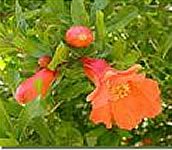 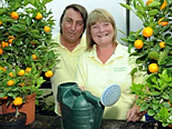 “Perhaps it’s time to throw caution to the wind and try something unusual. Take a fresh look and see how a ‘tropical’ plant could add a new dimension to your enjoyment in the garden.” “Perhaps it’s time to throw caution to the wind and try something unusual. Take a fresh look and see how a ‘tropical’ plant could add a new dimension to your enjoyment in the garden.”
“Many more varieties are grown at the nurseries on Anglesey. We are also happy to supply over wintering and cultivation information. We sell online and deliver all over the U.K.”
www.carreglefn-nurseries.co.uk
Hardmoor Honours
Karen Stacey, Head of Hardmoor Early Years Centre in Southampton, and gardening club parents, Denise and Emma, received the Hampshire Gardens Trust (HGT) Peter Maunder Trophy at the AGM in April.
Each year, the HGT awards the trophy to the group in Hampshire that has made the most distinctive contribution to school gardens that year.
Denise and Emma, gardening club volunteers at the Centre, worked up some designs with Karen’s support, to bring back to life a shady and overgrown corner of the playground.
Together with an HGT grant, donations from local organisations and the help of local contractors, Marc Waterman and Ollie Fletcher, they developed the space last year into a highly interactive sensory garden with lush planting, story telling area and outdoor classroom.
Bad Manure Creates a Stink
Two years on from reports of a nationwide contamination of composted stable manure by the new hormone herbicide, Aminopyralid, it still appears to be an ongoing problem, despite the products containing this herbicide having been taken off the market at one time.
Back in June 2008, gardeners and allotment holders across the UK started reporting crops mysteriously dying off, or failing to grow properly, following the addition of proprietary and well-rotted stable manure to their soils.
Aminopyralid was developed to kill broadleaved weeds on grassland. It clings strongly to plant tissues but it appears that when ingested by animals, the chemical doesn’t get broken down in normal digestive processes but is passed straight through urine and manure and onto bedding materials.
Consequently, high concentrations of Aminopyralid remain despite normal rotting and composting processes, affecting the growth of sensitive plants, particularly beans, potatoes and tomatoes grown on the manure.
Jane Hughes from Winchester has been affected and offers the following advice on checking for the presence of contaminated manure: “The only way is to do a simple test of any incoming manure or compost by growing tomato or broad bean seeds in a sample mixed with bagged compost and comparing with a control pot of seeds in compost alone.” Further guidance at:
www.allotment.org.uk/garden-diary/273/aminopyralid-contaminated-manure/
California Dreaming…
If there’s one plant that can be described as ‘sunshine in a packet’, then it has to be Eschscholzia californica, the Californian Poppy. After the weather became more unsettled in north Wales towards the end of June, a hastily sown patch of these poppies came into flower at about the same time and have added a welcome splash of brightness and warmth to our front garden every day.
I sowed a packet of Eschscholzia californica Monarch Mixed directly into recently prepared soil back in May. They germinated rapidly in the warm conditions and are likely to self seed nearby, too, meaning that we will have these cheerful, nodding flowers for some time to come.
The colours in this mix range from cerise pink through golden orange to vanilla white over glaucous, blue-green feathery foliage. Ideal for a sunny position on poor soil.
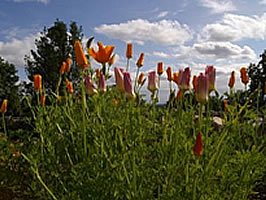 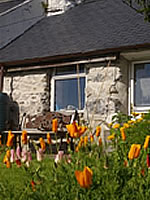
Invading Forces…
According to the history books, the last time that mainland British soil was invaded was by a small French raiding party in 1797 along the north Pembrokeshire coast. But if you think that we have kept the British Isles free from menacing aliens in the 200 years since then, then I’m afraid you’d be wrong!
Via the fairly innocent route of introducing exotic and unusual plants into our gardens, some ‘escapees’ have rapidly colonised many areas of the open countryside.
Here are the top three invaders causing most concern:
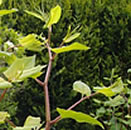 Japanese Knotweed Japanese Knotweed
Fallopia japonica var. japonica was introduced as an ornamental shrub in the mid nineteenth century and has spread along watercourses, waste ground and rail and transport routes. They out-compete native plants, growing up to 40mm per day. It is an offence to plant or cause Japanese Knotweed to spread in the wild. www.netregs.gov.uk/netregs/63101.aspx |
|
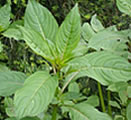 Himalayan Balsam Himalayan Balsam
Impatiens glandulifera spreads rapidly along stream banks and in marshy and low-lying land and gardens. This quick-growing, tall annual spreads by shooting out its seeds. It’s easy to pull out and should be disposed of carefully to avoid any vegetative regrowth or seed spilling. Botanists believe the plant’s flowers attract bees and other pollinators to such an extent that other plants in the area become neglected. www.netregs.gov.uk/netregs/63105.aspx |
|
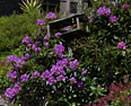 Rhododendron ponticum Rhododendron ponticum
This tough, purple-lilac flowering evergreen shrub is a familiar sight on scree slopes and mountainsides across North Wales. It can produce several thousand seeds per year that can be blown more than 100m by wind. Once established, few other plants can grow under the dense light-less canopy, leading to areas completely dominated by the species. www.netregs.gov.uk/ |
|
Step by Step…
In a mountainside garden, sooner or later you have to deal with steps. We needed to replace the narrow steps up from the front drive area towards the house entrance.
Working with our walling contractors, we incorporated curving steps that sweep up in an unusual but attractive way. I used a well known formula for calculating optimum tread (T) and riser (R) dimensions: 2R + T = 26” (660mm).
The steps work really well, and a large boulder that was lying in the garden now has pride of place as our ‘greeting stone’. We also relocated our old iron stove postbox to a convenient place at the foot of the steps at the same time.
Here’s a ‘before and after’ picture set:
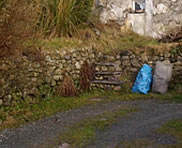 
Cuttings…
Fed Up
The British Trust for Ornithology is warning about the dangers of dirty bird feeders and baths. The BTO believes that half a million greenfinches have been killed this year alone because of the parasite, Trichomoniasis, which flourishes in damp conditions in bird feeders and on bird tables. Best advice is to regularly and thoroughly clean your bird-feeding equipment. www.bto.org/
Garden Design Competition for Wales?
I was recently invited to follow up a suggestion to link a national garden design competition in Wales with the annual Eisteddfod event by writing an article for the Institute for Welsh Affairs magazine, ‘Agenda’ for wider discussion. www.iwa.org.uk
Midges Beware: Avon Calling
According to seasoned rock climbers here in North Wales, the best midge repellent on the market is… Skin So Soft by Avon.
Rooks, Rabbits & Raspberries…
Winter finally loosened its icy grip sometime around Easter in our neck of the woods; and as ever, it was the actions of the local fauna and flora that brought the change of the seasons to our attention.
While we were busy on a myriad tasks, two pairs of rooks established nests in our central and top chimneys! We now have noisy flues and much buzzing and low flying from over-protective parents when we are in the garden.
One of our neighbours also let us know that the mountainside is being plagued by rabbits for the first time in many years. I have lost sproutings in one raised bed to the munchings of a bold bunny and have now covered all beds with chicken wire.
And despite best efforts to tame the raspberry patch last autumn, stray runners have spread far and wide in a bid to confound and demoralise me!
Better order the jam jars…
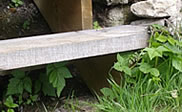 < Just Desserts < Just Desserts
The raspberry patch is taking a little longer to bring under control
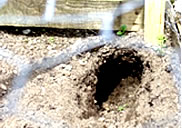 < Bunny Bugs < Bunny Bugs
Rabbits are a problem across the area this year, including our salad patch
Mark Rendell
garden designer
____________________________________________________________
Imaginative and affordable design
and planting schemes for every kind of garden
www.thegrowingcompany.co.uk
t: 023 8023 3768 m: 07780 920653
|

